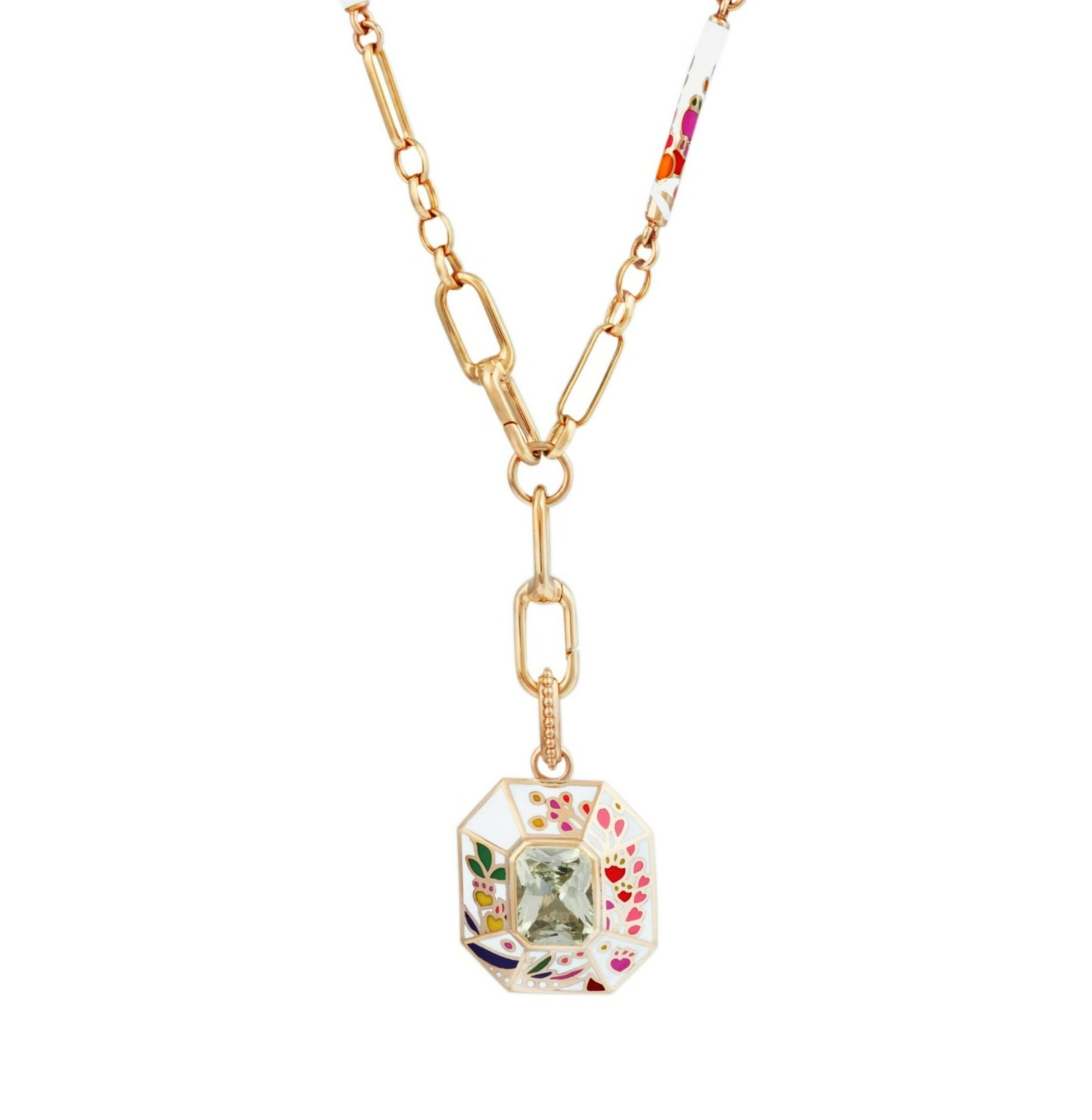Sari Lucknow Pendant Necklace
14ct yellow gold, lacquer enamel and mint chrysoberyl
(This colorway has been sold. Please contact Rossella for a new edition.
The Sari collection is made in London; at least 4 people with over a century of learned skill are involved in the production of each Alice Cicolini piece.
The Sari collection is inspired by the myriad patterns, weaves and colours of this iconic 5 yard length of fabric. Within its dimensions, the sari holds so much symbolism; a marker of national and regional identity, different patterns and weaves can also be worn to mark the passing of the seasons, and the wrapping style indicating what traditions of work the wearer might come from. From the stark but rich simplicity of Kerala’s white and gold geometric lines, to the intricate riots of fronds, flowers and birds that characterise the textiles of Gujarat and Madya Pradesh, the sari encapsulates a universe of meaning.
This collection has been inspired by the subtleties of colour combination, the juxtaposition of matte and high shine surfaces created by woven gold in the saris of Benares and Kerala, the balance of transparency and opacity in the Jamdani style and the particular graphic rendering of temples and birds from the saris of Odisha. Alice has deployed elements of the granulation technique, established in Greece but carried to India by Alexander the Great and reimagined in the Indian style. She has also created a new enamel technique for the collection, introducing the first rendering of the marbling technique in lacquer.
14ct yellow gold, lacquer enamel and mint chrysoberyl
(This colorway has been sold. Please contact Rossella for a new edition.
The Sari collection is made in London; at least 4 people with over a century of learned skill are involved in the production of each Alice Cicolini piece.
The Sari collection is inspired by the myriad patterns, weaves and colours of this iconic 5 yard length of fabric. Within its dimensions, the sari holds so much symbolism; a marker of national and regional identity, different patterns and weaves can also be worn to mark the passing of the seasons, and the wrapping style indicating what traditions of work the wearer might come from. From the stark but rich simplicity of Kerala’s white and gold geometric lines, to the intricate riots of fronds, flowers and birds that characterise the textiles of Gujarat and Madya Pradesh, the sari encapsulates a universe of meaning.
This collection has been inspired by the subtleties of colour combination, the juxtaposition of matte and high shine surfaces created by woven gold in the saris of Benares and Kerala, the balance of transparency and opacity in the Jamdani style and the particular graphic rendering of temples and birds from the saris of Odisha. Alice has deployed elements of the granulation technique, established in Greece but carried to India by Alexander the Great and reimagined in the Indian style. She has also created a new enamel technique for the collection, introducing the first rendering of the marbling technique in lacquer.
14ct yellow gold, lacquer enamel and mint chrysoberyl
(This colorway has been sold. Please contact Rossella for a new edition.
The Sari collection is made in London; at least 4 people with over a century of learned skill are involved in the production of each Alice Cicolini piece.
The Sari collection is inspired by the myriad patterns, weaves and colours of this iconic 5 yard length of fabric. Within its dimensions, the sari holds so much symbolism; a marker of national and regional identity, different patterns and weaves can also be worn to mark the passing of the seasons, and the wrapping style indicating what traditions of work the wearer might come from. From the stark but rich simplicity of Kerala’s white and gold geometric lines, to the intricate riots of fronds, flowers and birds that characterise the textiles of Gujarat and Madya Pradesh, the sari encapsulates a universe of meaning.
This collection has been inspired by the subtleties of colour combination, the juxtaposition of matte and high shine surfaces created by woven gold in the saris of Benares and Kerala, the balance of transparency and opacity in the Jamdani style and the particular graphic rendering of temples and birds from the saris of Odisha. Alice has deployed elements of the granulation technique, established in Greece but carried to India by Alexander the Great and reimagined in the Indian style. She has also created a new enamel technique for the collection, introducing the first rendering of the marbling technique in lacquer.




